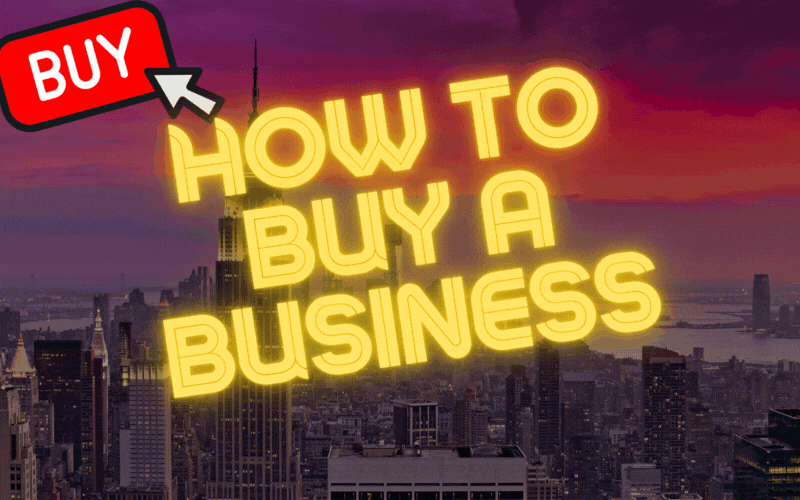
Expert Advice On How to Buying an Ecommerce Business in 2023
This article is the definitive how to guide on buying ecommerce businesses in 2023!
I’m George Moulos from Ecommerce Brokers. I’m an online business broker that has been helping people build, buy, and sell ecommerce businesses for over a decade. We have videos about building, buying and selling ecommerce businesses on YouTube and you can Subscribe Here!
I’m going to take you through how to buy a business and what the best practices are for sourcing deals. Then I’ll take you through completing due diligence and closing deals and at the end of this article I’ll share my 3 tips for buying businesses.
1. How Do You Buy A Business?
You buy an ecommerce business after the process of sourcing, due diligence and drafting documents then for it upfront and or over a period of time.
There’s a lot more to the process as you can imagine so let’s dive into all the steps involved with a business acquisition and how you can avoid all the pitfalls that many first time buyers fall into.
2. Buy or Build?
This has and always will be the big question in mergers and acquisitions. In my opinion it comes down to what part of the entrepreneurial journey you’re up to, what current resources you have and what you want to be doing with a business on the day to day basis.
Investment of time and money
If you’re starting your entrepreneurial journey and don’t have funds to invest, don’t have a general or sophisticated skill set in running ecommerce businesses and you have ample time to spend building a business, then it would be best to build a business. However, if you have some funds and an understanding of at least some aspects of running a business and don’t want to spend 3-12 months doing the hard yards of starting and testing that is necessary for starting an ecommerce business buying is definitely the best option for you to achieve your business goals.
Most of the buyers that we have worked with have been entrepreneurs or people who want to become entrepreneurs who have the funds and or the skills to buy and operate an ecommerce business.
This question can and should also be asked on a per deal basis. With each business a buyer must ask themselves if they are able to start this business from scratch with the same amount of money the seller is asking for.

3. What Are the Benefits of Buying an Ecommerce Business?
Validated Products:
Without a doubt the biggest advantage to buying a business vs building it from scratch is the enormous amount of time you will save as you are acquiring a business that has already validated its product market fit and sales channels. They’ve done the hard yards in testing and perfecting the products and also validated that they can sell the product for a profit. This not only saves a ton of time but usually thousands of dollars as well.
Reliable Suppliers:
Building and securing reliable manufacturers can be difficult for even established companies and is extremely tedious to build these relationships from nothing when you’re starting out. This is all taken care of when you’re acquiring a business that has signed supplier agreements with multiple months or years of a reliable track record.
Automation & Delegation:
The efficiency of acquired businesses is far superior to those you must start from scratch. Most sellers have delegated or automated marketing, customer support, logistics and other time consuming tasks to their team or through software so a buyer can come in and spend minimal time each week working in the business and focus on working ON the businesses growth rather than the minutiae of day to day operation.
Brand Equity:
Reputation, reviews and quality service is something that only comes with time and attention to detail and cannot be achieved within a couple of months. This is the main thing buyers look for in businesses and is quantified by the quality and quantity of reviews, social media followings and engagement, email list size and engagement, returning customer rate and trademarks.
Stability:
The first year of starting a business is fraught with ups and downs that most entrepreneurs don’t survive. In year 2 and 3 good businesses can achieve stability. That’s the time you can buy and take advantage of this stability.
Risk:
Ultimately the biggest deciding factor for buyers is the massively reduced risk in acquiring rather than starting a business. When acquiring a business, in most cases if you acquire a business and let it operate as usual, within a year or two the business will pay itself off in a stable and reliable fashion. Whereas if you invest time and funds into starting a business there is absolutely no guarantee that you will see ROI, and statistically you are likely have have your new business fail within the first year.

4. What Ecommerce Businesses Can you Buy?
The short answer is that you can buy any business or ecommerce asset that makes money. As long as revenue is coming in you can acquire it.
Here’s a list of all the types of ecommerce businesses that are available for you to buy:
- Shopify/Wordpress DTC Ecommerce Businesses
- Amazon FBA Business
- Shopify/Wordpress Dropshipping Business
- Marketing Agency Business
- Google AdSense or Display Advertising Business
- Affiliate Sites/ Amazon Affiliates Business
- SaaS Business
- Mobile App Business
- Productized service business
5. What Does A Buyer Usually Look Like?
If you’re thinking about buying a business it’s worth considering who your buying competition is and what position they are in that they are successfully buying businesses. Most successful business buyers are:
- Motivated and Disciplined: This is a normal thing for most entrepreneurs but doubly important when you’re at the acquisition phase of your entrepreneurial career.
- Dedicated Time: A buyer has the spare to not just get the acquisition done but also has the spare time to dedicate to the running of and growth of your acquisition.
- Generalist: Although you can hire and outsource tasks in the business it is common that most buyers have a sophisticated understanding of all the different parts of their business.
- Funds: This one goes without saying. You need to have the funds or have access to investors with funds. This might also mean being able to get a loan or finance the deal.
5. What is Your Acquisition Criteria?
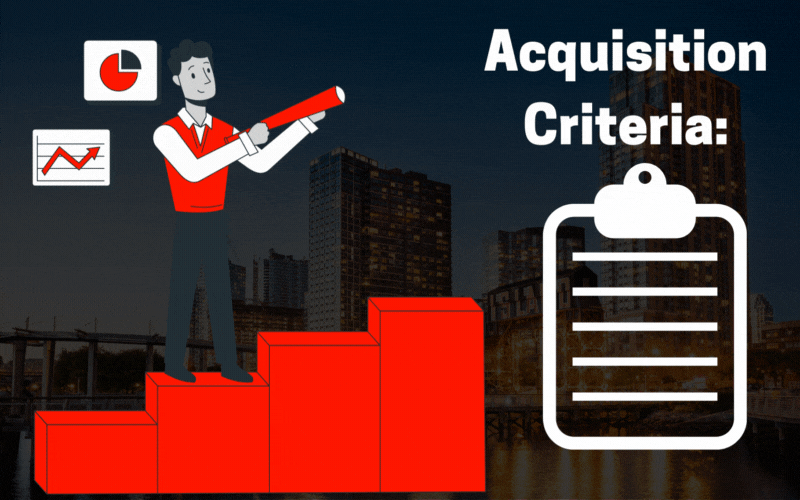
The first step to buying a business is defining what your acquisition criteria is and what you can and can’t take on as a new business owner. The first big question you need to ask when defining your acquisition criteria is “Do I want an ecommerce business or a brick and mortar business?”. Once you know this you can determine where you should look to find businesses to buy. For this article we are going to focus on the ecommerce business option.
Setting out a clear acquisition criteria before you start looking for your business is important so you don’t get distracted and waste time looking at businesses that won’t make good acquisitions. That being said it is important to be open to changing your acquisition criteria as needed as you explore the marketplace.
6. How Do I Get Started With An Ecommerce Business?
Okay, so you want to buy an ecommerce business. How can we further narrow down your decision? The first step is to take stock of your existing knowledge, experience or at least interests. If you have experience with a certain business model such as Amazon FBA or ecommerce DTC then your first acquisition should be of a business like that.
If you don’t have experience with a specific business you might want to narrow down your selection by a niche that you know relatively well. For example you might be an avid runner but have no ecommerce experience. This would be a good niche to find a business in as you likely have a keen sense for what is and isn’t a good product in the running niche.
7. How Much Does an Ecommerce Business Cost?
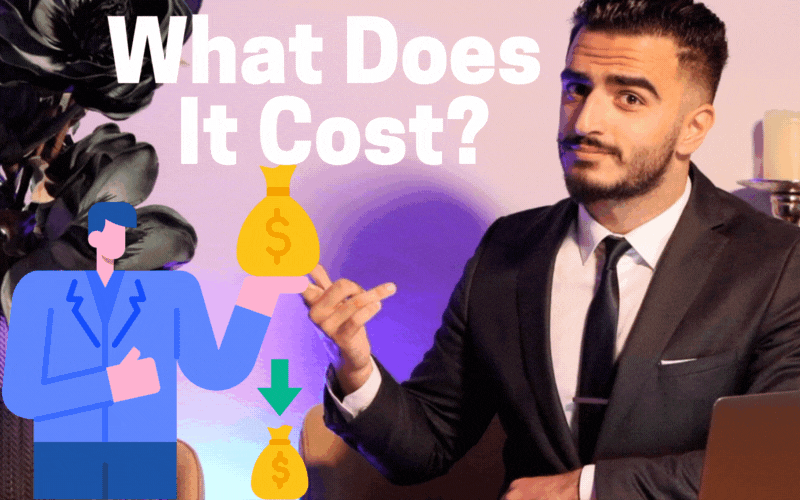
So you want to buy an ecommerce business of a specific model, for example physical product ecommerce DTC (direct to consumer) in the running niche. The next step is to identify what your budget is for your acquisition. You can define this number one of two ways.
- 1. Start with a set budget
- 2. Start with an amount of profit you’d like to be making per month from the business for example $20,000 USD.
- 3. Then you can multiply that by 12 and then by 3 to get an idea of what a business with that sort of cash flow costs.
- So $20,000 x 12 equals $240,000 and at a 3X multiple which is an average multiple would come to a valuation of $720,000 USD.
This is what you can expect to pay for a business that produces that sort of cash flow. Now if you take advantage of seller financing and or earn out you can further reduce the upfront expense to almost half of the valuation. If you’re interested in how you can pay as little as 50 to 10% on a business upfront subscribe below as I’ll be releasing an article on how to do just that!
8. Where To Buy An Ecommerce Business?
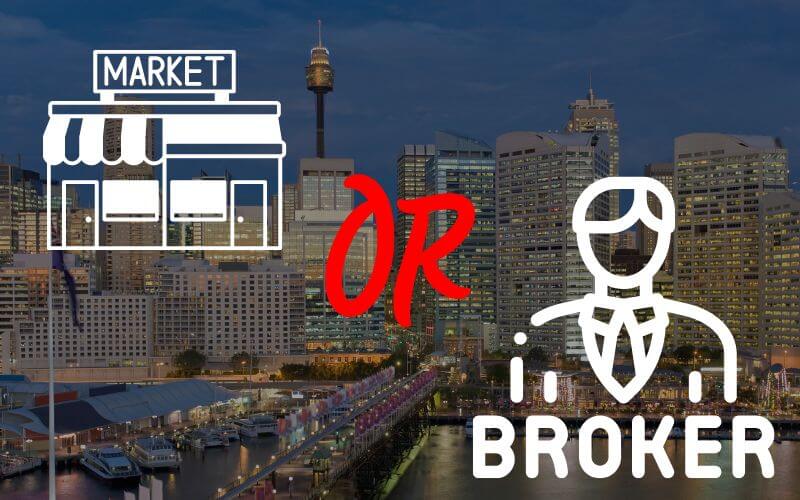
Now that you know your budget and you know the type of business you want to buy it’s time to start your sourcing process. The first thing you need to do is decide whether you’d like a professional to aid in this process. For a first time buyer this is a popular choice as an advisor will bring experience and expertise to the table and massively reduce the risk involved in a transaction for a first time buyer.
Ecommerce Brokers provides a service just like this called Elite Acquirers Gold. This service helps first time and even veteran buyers source up to 5 businesses a week with specialized broker analysis that allows buyers to quickly find a business that works for them. Ecommerce Brokers buy side service also helps in the communication and negotiation process of buying an ecommerce business and the final due diligence and closing of a deal. Follow this link to learn more: https://ecommerce-brokers.com/gold/
So you’ve got a buy side advisor or you’re going to source on your own. Where do you and or your advisor look? Marketplaces are the first place to look for businesses to buy and then brokerages themselves. A brokerage like Ecommerce Brokers will have multiple listings at any one time that you can review. A good step is to sign up to the email lists of these brokerages and marketplaces so you can keep updated on new listings. However, listings that are publicly available on brokerage websites are usually the deals that their private buyers passed on already. For this reason a buy side advisor can be highly effective in getting you the best deals.
6. What Should I look For In An Ecommerce Business?

So you’re looking at 20 to 30 businesses a week from reputable brokers and marketplaces, how do you analyze the businesses and make a decision on which to buy?
Well the first step is to see if they are profitable. Unless you’re looking for a distressed asset that you’d like to turn around and make profitable, something that can be hard for even experienced entrepreneurs, you want to focus on profitable businesses. The next step is that you want to confirm that it is at least a year old. A minimum of 12 months is the industry benchmark mainly because a brand needs at least 12 months to establish some brand equity and stability.
The next step is to see what trends are happening within the business. Have sales dipped unexpectedly? Is the business in a downturn? Did the business do only 2 good months of sales and now it’s dead? What is the story of the sale is the real question that we are asking ourselves when we look at the trend of the business as this can massively affect the valuation. If the business has declining sales for 6 months leading up to their exit then the valuation will go from an average 3-4X down to as low as 1-2X.
The next few sourcing steps include vetted and official financials and statistics that you can verify with platforms like Shopify’s backend, Amazons backend, Stripe, Google Analytics and on the expenses side you can confirm this with invoices, bank statements and tax returns.
This deeper analysis is usually completed during the due diligence process which comes after you’ve chosen a business to buy or at least further analyze and have signed a Letter of Intent to give you a period of time to complete this diligence.
What Is the Story of Each Businesses Exit?
The sale of a business is an emotional experience for buyer and seller and besides the financial elements of the business a buyer should really understand the story behind an exit. If the story of an exit is not a good one, buyers might be turned off or feel the business is headed in the wrong direction.
For example, let’s say a business ran for 2 years, it grew consistently for the first year and a half and in the last 6 months the business has plateaued in growth with a marginal decline in profit. Most sellers indicate they want to sell because they want to try something new, this reason with the financial data taken together is interpreted by most buyers that the seller doesn’t see a future in the business. For this reason having a good exit story is vital.
If a seller is growing their business and after 2 years of stable growth, with a strong 3 months prior to selling, the business story will be good. The buyer will know that they are selling a good business and believe the seller when you say you want to try something new.
What Should You Be Looking For In A Good Business?
- Brand Equity: A good business will have a strong reputation in their niche, good reviews and a high returning customer rate.
- Future Growth Opportunities: Seeing the future opportunities for growth in an acquisition is vital to not just maintain the sales that are existing but to actually grow the business. This could be expanding the product range or expanding to another geography.
- Reason For Sale: This is a vital question that is usually the first one a buyer will ask a seller. The seller really needs to have a good reason here as if they are selling to try and jump off a sinking ship then this is the type of business you want to stay away from. If they are selling a stable, profitable business and simply have taken it as far as they can and can prove and support this claim it’s likely a good business.
- Defensibility: The business must have built up the above listed items so that the business can actually have a defensible position in the market and can easily answer the buyer question “Could I make this business on my own with the amount of money I’m about to spend on it?”, with a No. This will include trademarks, a long strong reputation spanning at least 2 to 3 years.
What Is a Business Really Worth?
The valuation of a business should come from a multiple on the trailing 12 months net profit. The multiple in the ecommerce business sale world refers to the number you multiply your trailing twelve months (TTM) net profit, or similarly EBITDA (Earnings before Interest, Taxes, Depreciation and amortization). You can look at the industry averages by looking at brokerages and marketplace reports. For example Ecommerce Brokers sellers on average get a 3.9X multiple on their TTM net profit in 2021.
Now you can look more specifically at the type of business you’re analysing and compare that to similarly sold companies. If you’re looking at a content site in the car niche and it has 100k in TTM EBITDA, look for similarly sized content sites with similar EBITDA and if you can find a car content site with the same 100k net profit, even better! Then you are basing your valuation completely on data.
Competing With Other Buyers For A Business
If you have the time and want an unfair advantage over other buyers you can put together a thorough expansion plan to show the seller. This is a document that could be one to ten pages long that cover a handful of future business opportunities that the business could explore under your control. This is doubly important nowadays as almost all deals have a seller financing or earn out portion to the deal. This means that the seller is invested in the future success of the business under the buyer.
Projections
This document is not something you have to do, nor is it something that almost any buyers actually do. That being said when my buyers or their team have the time I implore them to put together their projections for up to 3 years into the future taking into account expansions in product range, marketing avenues and locations. When my buyers have done this it was usually a bidding war between buyers to acquire this business and they usually win out as the sellers believe in their abilities based on their projections. These are the documents that the buyers can take to their financiers, investors, bankers etc to show them why they should hand over their money for this deal. This leads to optimal financing terms.
Product Range Expansion
These documents should include the next 3-20 products you could add to the business and if you can get a few of the designs or SKU’s designed, tested and or validated from the seller that is going to make a great case to the seller that you are the right buyer. This could include expanding into new complimentary niches or categories that are logical for the customer base.
Geographical Expansion
The best way to indicate to a seller that you’re the right buyer and that it will grow post acquisition is running the numbers on expanding into new geographies.
For example, if the business is in the USA so far and is going well it would be great if you could test small scale marketing campaigns in the Canada, UK, Western Europe and Australia to get an idea of ROAS and the size of the opportunity in these new markets. With those tests you can logically make assumptions in your projections for what expansions would look like into these new markets over the next 1-3 years. An added bonus is listing a few 3PL and shipping partners.
Retail
Many sellers have been approached to do sell wholesale, do partnerships or to sell through a retail chain. Yet many businesses owned by founders don’t have the bandwidth to take advantage of these offers. Listing the wholesale and retail companies that are interested in selling their product in this expansion plan will further ignite excitement in the seller.
Marketing and Sales Channels
If the seller isn’t taking full advantage of marketplaces like Amazon or they’re on Amazon and they don’t have their own Shopify site, or if they have a Shopify site and they have a high repeat customer rate, but they haven’t implemented a subscription model or competent email marketing campaign list these opportunities in this document.
This helps sellers get an idea of why they should trust you as the buyer, and trust that you will pull through on your earn out or seller financing terms.
7. How Do You Write A Sales Agreement?

You’ve confirmed through due diligence, perhaps using a third party service provider to do this, that the business is as expected that you want to move forward with the acquisition. During the due diligence period you as the buyer will be expected to start the drafting of the sales agreement or asset purchase agreement depending on how you want to structure the deal. After sending this agreement draft to the seller’s attorney there will be some back and forth on small items.
Come the end of the due diligence period you’ll have a completion day where the transaction will occur, documents will be signed and you’ll have bought your business!
8. How Do You Pay?
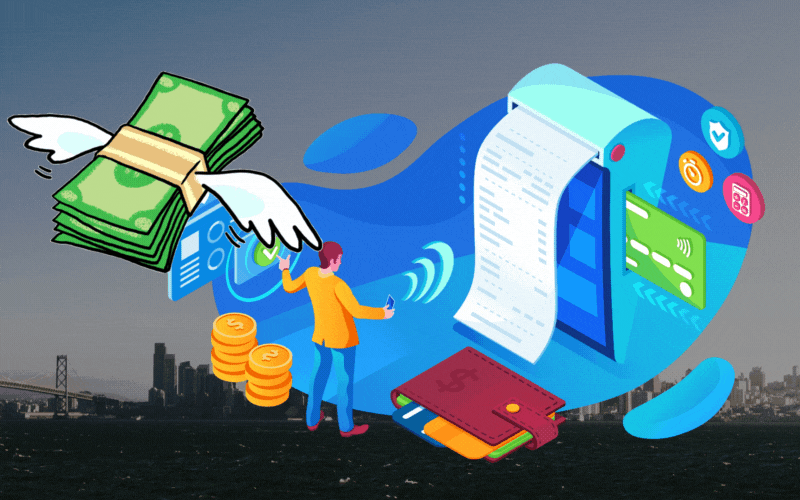
The big day has come. You’re going to buy a business. How do you pay?
The most common method is to use an escrow service. This can be provided by your buy side broker or the sell side broker. If both buyer and seller are independent they can use a service like escrow.com or an attorney’s escrow service. This means that your funds for the transaction will be kept in escrow until the assets have been transferred into your possession and you have signed the sales agreement.
9. 3 Tips When Buying An Ecommerce Business:
Now here are my 3 tips for buying a business:
- Start In A Familiar Space:
- I can’t stress this enough. Start with something you know. When buying a business there is a lot that you will need to learn and if you can start with at least some familiarity with a business model or niche, or at the very least being an avid consumer and customer of a niche you can start somewhere that has some familiarity.
- Focus On Due Diligence:
- It is very easy for first time buyers to not dig too deep when it comes to the due diligence process of buying a business and this can prove to be devastating. You need to not only verify every expense and sale recorded on the profit and loss sheet but you need to confirm and fully understand the entire operations of the business, because after the completion day this is your operation and although some of the team may stay on you are the person in charge now.
- Take Advantage of Buy-Side Experts:
- There is a growing pool of highly experienced useful buy side experts that can take the stress out of buying a business. Ecommerce Brokers buy side service does just this and more than anything they will negotiate a lower price for your acquisition and be an extra, experience set of eyes when reviewing your business. Follow this link to learn more: https://ecommerce-brokers.com/gold/
Here’s what a customer of Ecommerce Brokers Elite Acquirers Gold service has said about his experience:
10. Is Buying An Online Business Worth It?
Absolutely!
If you are looking for a buy side business broker look no further as Ecommerce Brokers is here for you. We can show you 5 relevant listings that match your acquisition criteria every week and help you acquire and close deals consistently. Follow this link to learn more: https://ecommerce-brokers.com/gold/
We also have videos about building, buying and selling online businesses on YouTube coming out every week and you can Subscribe Here!
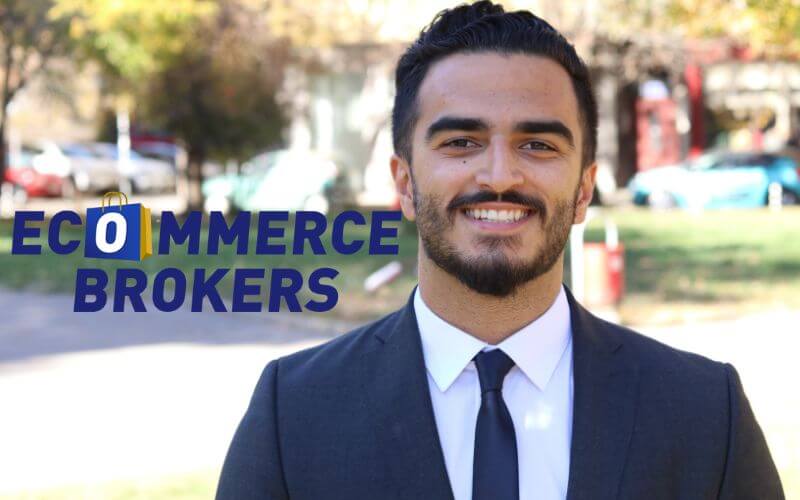
Now I have a question for you. Do you prefer ecommerce or offline businesses? Let me know in the comments below
Author Bio: George Moulos
Forbes 30 Under 30 2020, CEO of Ecommerce-Brokers.com
I own an online M&A firm called www.Ecommerce-Brokers.com and we have 11 years experience helping buyers and sellers acquire and sell millions of dollars worth of online businesses.
Looking To Buy? Visit our Elite Acquirers buy side broker service to learn more here
Looking To Sell? Visit our List With Us page to learn more here
